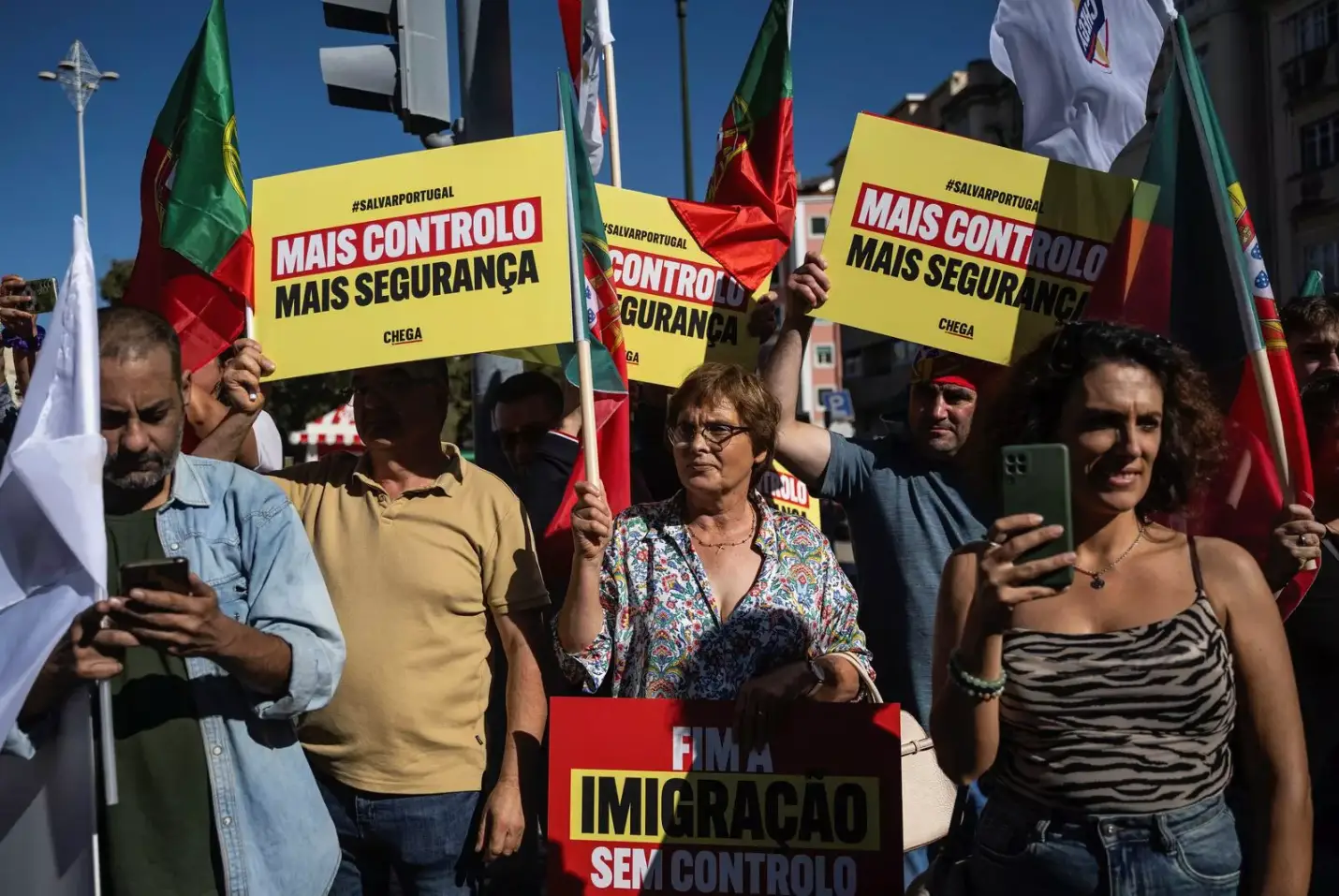With its third election in just over three years, Portugal has consolidated the trend of far-right growth affecting all of Europe — a trend that has been unfolding since the beginning of the political crisis in 2023, when Prime Minister António Costa (PS) resigned. This scenario has direct implications for the Brazilian community — the largest immigrant population residing in the country — which increasingly finds itself at the center of political and social narratives, many of which are marked by xenophobia, racism, and nationalism.
Portugal’s 2025 electoral context reinforced the centrality of the migration issue, particularly concerning Brazilians. With 58 deputies elected, Chega — the party led by nationalist André Ventura and known for its anti-immigration rhetoric — tied with the Socialist Party (PS), sharing the position of the second-largest political force in Portugal. In the lead, the center-right Democratic Alliance (AD) secured 89 seats in the Assembly of the Republic — far from the 116 needed for a majority that would allow it to govern without coalitions.
The shift in the political climate is already visible on the ground. In early May, the Portuguese government announced it would notify 18,000 undocumented immigrants to leave the country. Once notified, immigrants have up to 20 days to leave or face detention. The majority affected are from countries such as India, Pakistan, Bangladesh, Nepal, and Bhutan. Moreover, immediately following the May 18 elections, a new border control system was implemented, leading to wait times of up to five hours at Lisbon Airport, with reports of people falling ill and requiring medical attention.
Currently, more than 400,000 Brazilians with regularized residency live in Portugal, according to the Foreigners and Borders Service (SEF). That number rises to over half a million when including those who are undocumented or have dual nationality. Despite being legally integrated, Brazilians were frequent targets of attacks during the election campaign, with narratives linking them to “parasiting” the welfare system and contributing to urban insecurity. In televised debates, Ventura even proposed revoking legal benefits for immigrants — such as automatic access to the National Health Service (SNS) — and reevaluating already granted citizenships.
One phenomenon worth noting is the support among some Brazilians living in Portugal for Chega’s anti-immigration discourse. Although they constitute the largest foreign community in the country, certain segments of this population have aligned themselves with narratives that stigmatize other immigrants, particularly those from Asia and Africa. This posture is an attempt at differentiation and assimilation, in which these Brazilians try to distance themselves from even more marginalized groups in hopes of greater acceptance in Portuguese society. In doing so, they end up aligning with discourses that ultimately also harm them.
In this context, the election results become even more significant: as of May 18, Chega is no longer merely a protest party or ideological niche. With substantial representation and a consolidated discourse, Ventura has positioned himself as a central player in the political maneuverings of the Portuguese right. Although the Democratic Alliance has officially ruled out a formal coalition with Chega, there are clear signs of strategic alignment — particularly on issues such as public security, immigration, and the revision of social policies.
Among Brazilians, tension is growing. In recent years, many report increased hostility in their daily lives — on social media, in the workplace, and in public services. Chega’s rhetoric appears to resonate with segments of Portuguese society that, faced with economic crises and rising living costs, have come to see immigrants as scapegoats for structural problems such as low GDP and high rent prices.
At the same time, the political engagement of Brazilians in the country remains timid. Even though they are entitled to vote in local elections after five years of legal residence, few exercise this right. In legislative elections, where participation requires dual citizenship, abstention is extremely high. The gap between demographic presence and political presence is one of the factors weakening collective response capacity in the face of the far-right’s rise.
The scenario unfolding in Portugal is not much different from what is observed in other European countries: the normalization of hate speech as an electoral strategy, the institutional advancement of the far-right, and the increased vulnerability of migrant populations. In Portugal’s case, what stands out is that this advance is occurring in a country historically viewed as welcoming, pluralistic, and culturally connected to Brazil.
Through ethnographic and documentary research — including the observation of 150 posts by anti-immigration activists on X, interviews with young Chega members during the party’s 5th Congress in 2023, and analysis of official reports — we identified how Chega, since its founding in 2019, has built communicative repertoires on digital platforms based on the preservation of “national identity,” moral panic, and ethnic-racial hierarchies. This process gained traction in the “new social climate” recorded since late 2022, materialized in posters such as “Portugal needs a cleanup” and theories of population replacement and “remigration” (mass deportations akin to those proposed by Trump in the U.S.).
What is at stake, therefore, is not merely a party’s position, but the very idea of Portugal as an open and democratic society. The response to this threat will not come solely from parliamentary battles, but from the capacity of civil society, the press, and also immigrants themselves — who will need to transform their social presence into active political power. The future of Brazilians in Portugal — and of Portuguese democracy itself — depends on it.
*Machine translation proofread by Janaína da Silva.














